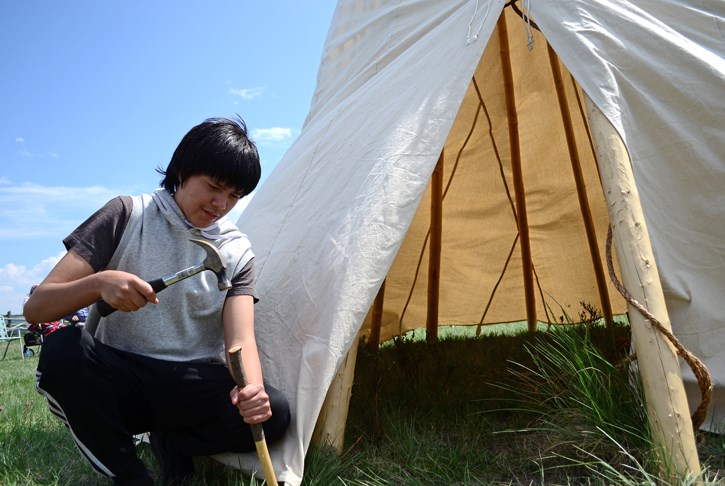STONEY NAKODA – Stoney Nakoda elder Glenda Crawler never learned how to put up a teepee.
Taken from her family at the age of seven and placed in a residential school in southern Alberta, the elder explained during the decade she was away from her parents, aunts, uncles and elders, how she missed out on learning parts of her culture when she was young.
“I feel regret and I was angry that they took me away,” she said solemnly sitting in her walker.
But Saturday (June 1) was a chance to regain cultural learning and knowledge, as Stoney Nakoda Nation members and individuals from the McDougall Stoney Mission Society held a ceremony at the McDougall Church historic site to raise a teepee for the first time.
“This is true reconciliation ... when there is no church there can still be a teepee,” said Gloria Snow, daughter of the late Wesley Chief John Snow and Mission Society board member.
Handcrafted by Nation members and Crawler’s relatives, the teepee directly addresses one of the Calls to Action put forward by the Truth and Reconciliation Commission report released in 2015. The commission was established and calls of action were recommended to redress the legacy of residential schools, introduced by the Canadian government with the intention to assimilate Indigenous children into Euro-Canadian culture and well documented as a place where physical and mental abuse occurred.“This is part of the reconciliation where we start making and building new relationships,” Snow said.
Surrounded by relatives, including her brother Wallace Snow, who said he remembers attending the church in the 1930s when he was four, Crawler sat with other elders and family as she watched Nation members, youth and volunteers tie together poles and assemble the frame.
“I’m excited,” Crawler said with a smile.
“And I’m looking forward to it – I hope it turns out good.”
Sitting adjacent to the empty lot where the McDougall Memorial United Church once sat, the historic site hosts a past full of mixed emotions.
Built in 1875 along Highway 1A east of Exshaw, the little white building that stood on the site was the first Protestant Church in the province before being abandoned for more than half a century and then restored in 1952. The church received historical site designation in 1979 from the Alberta government and was deemed a Municipal Heritage Resource by the MD of Bighorn in 2014.
On May 22, 2017, the McDougall Stoney Mission Church was destroyed when an early morning fire burned the building and everything inside.
Initially deemed accidental, the RCMP later confirmed the fire was being treated as an arson investigation after a police dog sniffed out traces of what was believed to be a fire-starting stimulant. Earlier this year, Const. Kary Moore with the Cochrane RCMP confirmed the investigation is still open.
After the tragic fire, the directors of the McDougall Church said they were flooded with support through a GoFundMe page, with hundreds of individuals offering their support in any way they could.
Shortly after the fire, Stoney Nakoda elder Tina Fox also went to visit the site and said it was “sad,” but the “community didn’t have much to do with the [church].”
“I respect the church, but I don’t attend,” Fox said in 2017, noting that for some elders and community members the church reminded them of the “harm and injuries” that happened during residential school.
“It would be nice to have the United Church of Canada come here and do some healing work to reconcile with our people – so we can co-exist without hatred.”
Out of the 94 calls to action, 11 were in regards to Church Apologies and Reconciliation, with one call to establish funding for “community-controlled healing and reconciliation projects.”Fast-forward two years after the fire and Crawler said she felt “good” at the inaugural ceremony.
During the teepee raising, Crawler’s daughter, Trudy Wesley, taught the youth and volunteers how to get the handcrafted teepee canvas over the frame.
“We’ve been putting up teepees since my great-grandfather,” Wesley explained, noting she has watched teepees being assembled since she was four years old.
“I’m enjoying it, my mom missed all this in residential school and you know she told me that she might not heal from residential school, but this is healing for them.”
The McDougall Stoney Mission Society announced earlier this year it will be seeking restoration for the building, after being presented four options from Alberta officials – leave the site as is; create what they call a “Ghost Church,” a structural representation of the original church with no roof or walls; build a modern church; or restore the former structure.
But work won’t proceed before reconciliation work occurs with the Nation. The inaugural teepee raising ceremony was attended by elders, Nations members, youth, board members and volunteers, followed by a community picnic.
Snow noted this was a way to “build a new foundation.”
“This is my culture,” Crawler said with a smile, as she watched the youth tie the canvas together.
“I have to learn this and teach it to my young people before I die.”
READ MORE RELATED ARTICLES HERE:
Stoney Nakoda has new acting Tribal Administrator




